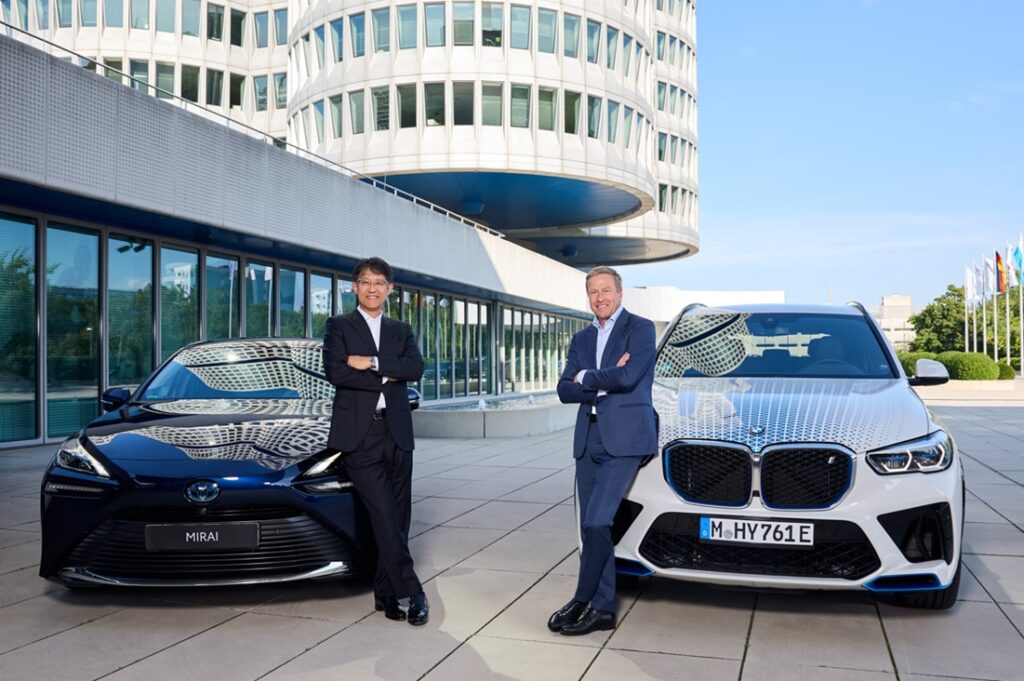BMW Teams Up with Toyota to Introduce Hydrogen Vehicles Starting in 2028
In a significant move towards diversifying vehicle technology, BMW AG has announced a partnership with Toyota Motor Corp. to develop and market hydrogen-powered cars, with the first models set to hit the market in 2028. This collaboration aims to establish hydrogen fuel-cell technology as a viable alternative to battery-electric vehicles (EVs).


In a significant move towards diversifying vehicle technology, BMW AG has announced a partnership with Toyota Motor Corp. to develop and market hydrogen-powered cars, with the first models set to hit the market in 2028. This collaboration aims to establish hydrogen fuel-cell technology as a viable alternative to battery-electric vehicles (EVs).
The partnership will see both automotive giants jointly develop a new generation of fuel-cell powertrains. This strategic alliance is expected to leverage shared resources and expertise to reduce production costs and enhance the competitiveness of hydrogen technology. BMW plans to introduce a hydrogen variant of an existing model by 2028.
The push for hydrogen vehicles comes amid growing challenges faced by current hydrogen-powered cars, which have struggled with high costs and limited fueling infrastructure. Despite the promising long driving ranges and zero emissions—producing only water—hydrogen cars have yet to gain widespread market traction. Last year, global sales of hydrogen vehicles fell to a mere 9,000 units, as reported by BloombergNEF.
Proponents of hydrogen technology argue that it offers a practical solution for regions where battery-charging infrastructure is insufficient to support a full transition to electric vehicles. BMW and Toyota’s collaboration is seen as a step towards overcoming these hurdles, with joint development potentially leading to reduced costs and broader adoption.
BMW has been exploring hydrogen technology for some time, operating a small test fleet of hydrogen-powered iX5 sport utility vehicles since 2023. CEO Oliver Zipse has suggested that hydrogen might also feature in BMW’s upcoming “Neue Klasse” line of EVs, slated for release next year.
Michael Rath, head of BMW’s hydrogen-vehicle program, expressed optimism about the future of hydrogen technology, stating, “We are convinced that hydrogen will play a more important role in the future.” The partnership with Toyota underscores this commitment, with both companies aiming to drive forward the development and adoption of hydrogen vehicles in the coming years.
As the automotive industry continues to explore and implement alternative powertrains, the BMW-Toyota collaboration marks a notable effort to expand the range of options available to consumers, potentially shaping the future of clean transportation.
Sources By Agencies








Great Article bro, slot gacor situs slot gacor
Great Article bro thanks, situs slot gacor maxwin
Baddiehubs I’m often to blogging and i really appreciate your content. The article has actually peaks my interest. I’m going to bookmark your web site and maintain checking for brand spanking new information.
Baddiehubs I just like the helpful information you provide in your articles
Nutra Gears I’m often to blogging and i really appreciate your content. The article has actually peaks my interest. I’m going to bookmark your web site and maintain checking for brand spanking new information.
allegheny county real estate Nice post. I learn something totally new and challenging on websites